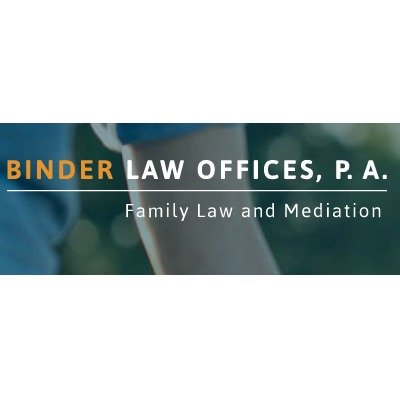Best Divorce & Separation Lawyers in Minnesota
Share your needs with us, get contacted by law firms.
Free. Takes 2 min.
Free Guide to Hiring a Family Lawyer
Or refine your search by selecting a city:
List of the best lawyers in Minnesota, United States
About Divorce & Separation Law in Minnesota, United States
Minnesota divorce and separation law governs how married couples can legally dissolve their marriage or formalize a separation. It covers issues such as property division, child custody, child support, spousal maintenance (alimony), and procedures for filing divorce or separation papers. Minnesota is a "no-fault" divorce state, which means that a spouse does not have to prove wrongdoing or fault by the other party to obtain a divorce. The only requirement is for one spouse to state that the marriage has broken down irretrievably. Legal separation is also available and allows couples to formally address financial and parental responsibilities without officially ending the marriage.
Why You May Need a Lawyer
Divorce and separation can be emotionally and legally complex. Common situations where people seek legal assistance include disagreements about child custody or parenting time, disputes over child or spousal support, division of high-value assets or debts, protection against domestic violence, or questions about the legal process itself. A lawyer can also help ensure that your rights are protected, documents are properly prepared and filed, and settlement agreements are fair. Even uncontested divorces can benefit from legal review to avoid unforeseen consequences or future disputes.
Local Laws Overview
Minnesota has specific legal requirements and procedures regarding divorce and legal separation:
- No-fault divorce: Either spouse can file for divorce without blaming the other. It is enough to state that the marriage is irretrievably broken.
- Residency: At least one spouse must have lived in Minnesota for at least 180 days before filing for divorce.
- Filing process: Divorce starts by filing a Summons and Petition for Dissolution of Marriage with the local district court.
- Property division: Minnesota uses "equitable distribution" - a fair, but not always equal, division of marital property.
- Child custody: The law considers the best interests of the child, including physical and legal custody arrangements and parenting time schedules.
- Child support: Minnesota has guidelines based on both parents' income, number of children, and parenting time.
- Spousal maintenance: May be awarded based on the length of marriage, each spouse’s financial resources, and other factors.
- Legal separation: Similar to divorce, but the marriage is not legally ended.
- Alternative dispute resolution: Minnesota courts may require mediation or other dispute resolution methods before a trial.
Frequently Asked Questions
What is the difference between divorce and legal separation in Minnesota?
Divorce legally ends the marriage, allowing both parties to remarry. Legal separation does not end the marriage, but allows spouses to formalize arrangements regarding children, property, and support while remaining legally married.
Do I need to prove fault to get a divorce in Minnesota?
No, Minnesota is a no-fault divorce state. You do not need to prove that your spouse did something wrong, only that there has been an irretrievable breakdown of the marriage.
How long does a divorce take in Minnesota?
The time varies depending on whether the divorce is contested. Uncontested divorces may take a few months, while contested cases involving disputes over property or custody can take much longer.
How is property divided in a Minnesota divorce?
Marital property is divided based on what the court considers fair, which may not always be a 50-50 split. The court considers factors such as each spouse's resources, contributions to the marriage, and needs.
What factors do Minnesota courts consider for child custody?
Court decisions are based on the best interests of the child. Factors include the child's needs, the parent-child relationship, each parent's ability to care for the child, and the child's preference if mature enough.
How is child support calculated?
Child support is determined using state guidelines, taking into account both parents' incomes, the amount of parenting time, and other relevant expenses such as health care and childcare.
Can grandparents get visitation rights in Minnesota?
Grandparents may be granted visitation if it is in the child's best interests and does not interfere with the parent-child relationship, typically in cases where one parent is deceased or in other specific circumstances.
Do both spouses have to agree to the divorce?
No. If one spouse wants a divorce but the other does not, the court can still grant a divorce as long as the petitioner can show the marriage is irretrievably broken.
What is Alternative Dispute Resolution (ADR) in divorce?
ADR includes methods like mediation or early neutral evaluation to help spouses resolve disputes outside of court. Minnesota courts often encourage or require ADR before a trial.
What if I cannot afford a lawyer?
There are legal aid organizations and court resources available in Minnesota for those who qualify based on income. The court may also order the other spouse to pay attorney fees in some circumstances.
Additional Resources
- Minnesota Judicial Branch: Provides forms, guides, and information about family law procedures.
- LawHelpMN: Offers free legal information and referral to Minnesota residents.
- Minnesota State Bar Association: Has a lawyer referral service and legal resources for the public.
- Legal Aid Societies: Various organizations assist low-income individuals with family law matters.
- County Family Court facilitators: Many counties have court staff who can provide procedural guidance.
Next Steps
If you are considering divorce or separation in Minnesota, begin by gathering important documents such as financial records, property deeds, and information related to children. Consider meeting with a family law attorney to discuss your situation and understand your rights and options. If you need help finding a lawyer, you can contact the Minnesota State Bar Association, a local legal aid organization, or family court facilitators. If safety is a concern, seek immediate help from law enforcement or a domestic violence support organization. Taking early action and seeking reliable legal advice can help you protect your interests and work toward a fair resolution.
Lawzana helps you find the best lawyers and law firms in Minnesota through a curated and pre-screened list of qualified legal professionals. Our platform offers rankings and detailed profiles of attorneys and law firms, allowing you to compare based on practice areas, including Divorce & Separation, experience, and client feedback.
Each profile includes a description of the firm's areas of practice, client reviews, team members and partners, year of establishment, spoken languages, office locations, contact information, social media presence, and any published articles or resources. Most firms on our platform speak English and are experienced in both local and international legal matters.
Get a quote from top-rated law firms in Minnesota, United States — quickly, securely, and without unnecessary hassle.
Disclaimer:
The information provided on this page is for general informational purposes only and does not constitute legal advice. While we strive to ensure the accuracy and relevance of the content, legal information may change over time, and interpretations of the law can vary. You should always consult with a qualified legal professional for advice specific to your situation.
We disclaim all liability for actions taken or not taken based on the content of this page. If you believe any information is incorrect or outdated, please contact us, and we will review and update it where appropriate.
Browse divorce & separation law firms by city in Minnesota
Refine your search by selecting a city.












